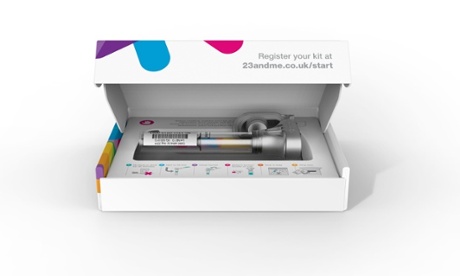
Genetic testing company 23andMe is launching its personal genome service in the UK after it was banned in the US.
The service allows people to send their saliva in a testing kit to have their DNA screened for genes associated with certain inherited conditions, such as cystic fibrosis or sickle cell anaemia, and other genetic markers relating to parts of their lives and ancestry.
“We can take complicated genetic information and distill it in language that people can actually understand,” the 23andMe chief executive Anne Wojcicki said.
“The genome is fascinating, and it’s the most exciting scientific revolution of our lifetime. The goal is to keep people engaged with their own genome, so that they know what it means for them and then keep them abreast of the scientific discoveries as they unfold.”
The spit kits cost £125 and are sent to the Netherlands before testing in the US. The results, which take approximately six to eight weeks, allow users to both browse the raw code of their genome and use tools to investigate their genetic makeup.
‘DNA isn’t something scary or all about disease’
The data is used to generate reports explaining common genes and genetic differences, such as how people metabolise caffeine to why some respond better to exercise. It also produces ancestry reports and further information as new research is published but does not advise on health matters. People could take the data to a doctor, however.
The data is stored encrypted and separated from identifying details on 23andMe’s servers, accessible only to the subject. People can share their anonymised genetic data with researchers as part of a 600,000-strong genetic database, with their doctor or family, or remove it from the servers entirely.
“DNA isn’t something scary or all about disease, which is why we try to celebrate the long-tail of humanity – why is it some people like coriander and other fun things – rather than DNA is just about cancer or Alzheimer’s,” said Wojcicki.
“There is a division between the people who wear the white coats and those who don’t,” she said. “Science has a reputation of being inaccessible, for the super smart or the elite, but I want to make people realise that science is accessible to everyone and anyone can understand their genome and it is fascinating.”
‘Understandable concern that this type of genetic testing’
23andMe said it does not share the genetic data with insurance companies or any other interested party without a person’s explicit consent.
“The science is soundest behind 23andMe’s ancestry reports, which are good, but the majority of the rest of the reports are generally based on very small shifts of risk, which are better served by simply living healthier and getting more exercise,” said Dr Ewan Birney – associate director of the EMBL-European Bioinformatics Institute in Cambridge and unconnected with 23andMe, although he has used one of its kits.
“Despite 23andMe’s careful use of language and explanation, there is an understandable concern that this type of genetic testing could cause inappropriate harm simply through people worrying excessively or becoming neurotic over these small increases in risk.”
In the UK, 23andMe is not the first to launch genetic testing. The NHS’s 100,000 genome project conducts full genome sequencing as opposed to genotyping, which compares common differences in known genes. The NHS’s project, which is set to complete its pilot stage by 2017 as part of analysing how best to use genomic data in health care, is “world leading”, said Birney.
“This government is developing the use of genomics for patient care within the NHS,” a Department of Health spokesperson said. “We welcome initiatives that help to raise awareness of genomics and those which enable people to take more interest in their personal health but we urge people to think carefully before using private genomic services as no test is 100% reliable.”
“For the curious and the scientists, 23andMe is fine, it’s fun and you can have a ball with your ancestry, but for the general population the NHS is truly working out how best to use this in a way that is world leading,” said Birney. “If you’re waiting for the technology to catch up with you, the NHS will deliver.”
‘Learned a lot over the last eight years’
The firm launched in the US in 2008, with Google one of its investors, but its personal genome service was banned by the US Food and Drug Administration (FDA) in 2013 under medical guidance reasons and the accuracy of the data gathered. The company was allowed to continue to selling its separate ancestry service and raw genetic tests without analysis.
Since 2013, 23andMe has hired a dedicated regulatory team and is currently working on obtaining FDA approval. Wojcicki said that the ban was part of a shift in regulation and the company has changed for its UK launch.
“We’ve learned a lot over the last eight years. We’ve been heavily involved with the UK Medicines and Healthcare Products Regulatory Agency (MHRA), obtained a CE mark and they have determined that we’re not a medical product, more an information product,” said Wojcicki.
“Products used in personal genome services are regulated by MHRA to meet minimum standards. People who use these products should ensure that they are CE marked and remember that no test is 100% reliable so think carefully before using personal genome services,” an MHRA spokesperson said.
• 23andMe admits FDA order ‘significantly slowed up’ new customers

